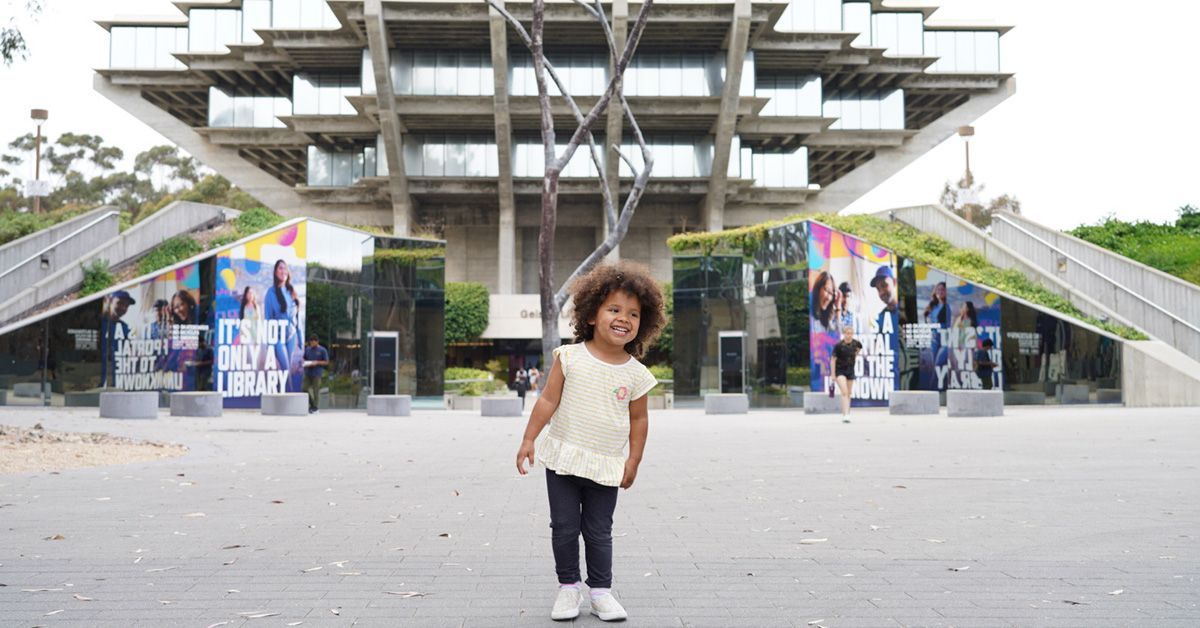Students with Dependents Navigate College and Caregiving
Three UC San Diego scholars provide insight into the student-parent experience
Story by:
Published Date
Article Content
Fresh out of high school and four months pregnant, Daisy Villanueva arrived at UC San Diego in fall 2018. Debilitating nausea and vomiting, isolation from loved ones and issues with transcripts had her convinced that her only option was to drop out.
Students with dependents—a class of students who identify as expecting or current parents, caregivers or guardians—represent a small but remarkable portion of UC San Diego’s student body. As of May 2025, just over 300 known students are juggling the responsibilities of caring for others while tackling the rigor of a UC San Diego education.
Though they often fly under the radar, students with dependents tend to have greater life experience, clear goals and as much or more volunteer experience than their peers. Still, they face a host of unique challenges. Degree completion, food and housing insecurity, child care access and affordability, health care, mental health and a lack of a sense of belonging are key concerns, among others, reported by the population.
The Students with Dependents (SwD) program, launched in 2022, aims to support these students’ academic achievement and personal well-being by connecting them to resources and services available across the expansive UC San Diego network. “As a proud former student with a dependent, I am thrilled to have the voices and gifts of our Triton students with dependents uplifted and celebrated,” said Vice Chancellor for Student Affairs and Campus Life Alysson Satterlund.
The SwD coordinator, Laurie Magulac, leads the development of policy projects to address financial and academic needs in collaboration with campus partners. She also helps create family focused programming, holds office hours and offers one-on-one consultations for students. “I want the community of parents and caregivers at UC San Diego to know that they aren’t alone,” said Magulac. “They are not without an advocate or a resource who can share their voice in more rooms while they're just tired and busy and doing a great job with everything in front of them.”
Fly under the radar as they might, UC San Diego Today is sharing three student-parent voices below.
Daisy Villanueva
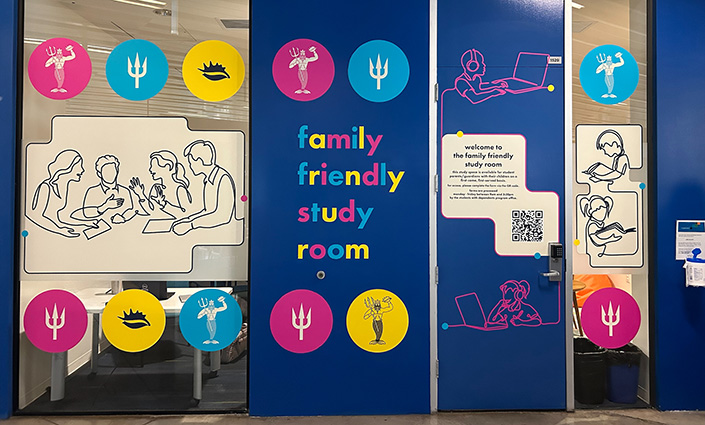
Villanueva did not drop out. At the advice of a counselor, she took a leave of absence two weeks into her first year. Four years later, she came back to UC San Diego, joined by her two daughters and fiancé, to pursue an undergraduate degree in neurobiology with hopes of attending medical school in the future.
Returning to campus didn’t come without its challenges. Villanueva struggled to secure child care and had to move campus apartments to find neighbors more empathetic to the sounds of young children.
Mostly, Villanueva has been met with understanding and kindness on campus—like the time the Revelle College provost offered to take her girls outside to play during lecture or when a professor offered her a new perspective after she broke down during office hours.
“I had a bad habit of comparing myself to other students. Hearing about all their extracurriculars and everything they’re doing to prepare for medical school while I had to go home and take care of my kids made me feel a type of way,” shared Villanueva. “Luckily, my professor helped me realize what being a mom and going to school was doing for me. I was building skills that I wasn’t even aware of—like being flexible, adaptable, empathetic and patient. I now feel like that’s more valuable than having 50 extracurriculars.”
Amira Noeuv
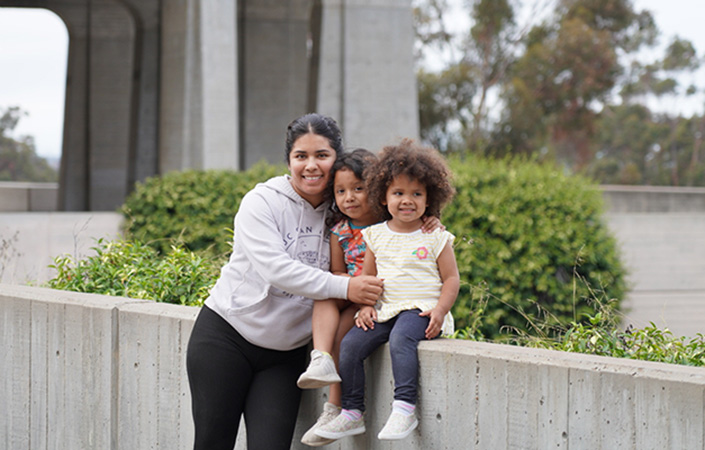
Amira Noeuv knew she wanted to start a family when she began her Ph.D. program in ethnic studies at UC San Diego. And in 2021, she and her partner welcomed their baby girl.
Since then, Noeuv has been her family’s strongest advocate for support on campus. Her advice to other student parents: “Seek out community. It’s the most important thing that will help you face challenges. Also, don’t be afraid to ask for help—ask for everything under the sun. The worst that can happen is you’ll be told no.”
Even if the space you’re in doesn’t make you feel seen, you make your presence known.
Building community and elevating student-parent voices is something Noeuv sort of fell into. As a community assistant with GFH CONNECT in HDH Graduate and Family Housing, she planned family-oriented events for residents, joined the Parents & Caregivers student organization—which she now champions—and got involved with the SwD program.
When tuition increased at the Early Childcare Education Center (ECEC) and the waitlist remained stagnant for the Child Care Access Means Parents in School (CCAMPIS) Program—a grant program for low-income parents in post-secondary education—Noeuv collected student signatures to initiate a Staff Town Hall. The meeting led to discussions among the SwD program, university leadership and the ECEC to increase awareness about CCAMPIS assistance. As a result, more student parents were able to access care at the ECEC, and Noeuv received full assistance for her child care costs starting in October.
As she prepares to enter academia, Noeuv is thinking about how she will support underserved student populations. “I’m able to bring my personal perspective to students’ struggles and relate,” she said. “My experience has made me a little bit more resourceful because I have had to be resourceful.”
Ana López Ricoy
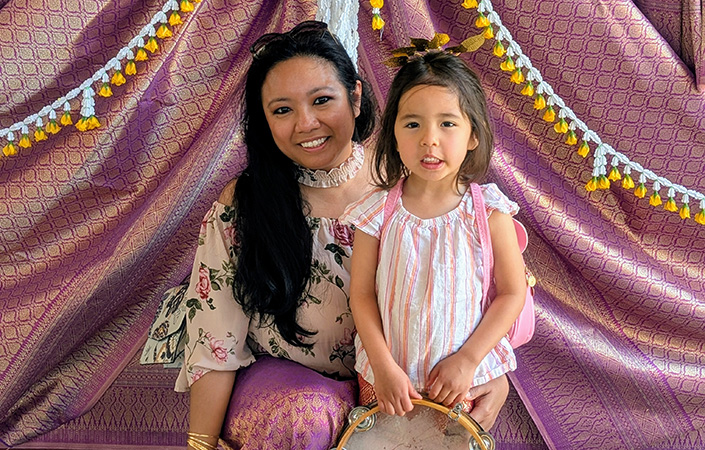
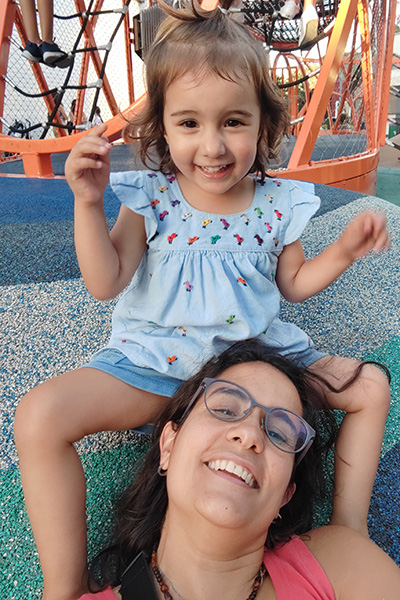
In the final stages of her sociology dissertation, Ana López Ricoy, an international student from Mexico City, finds time to write in the very early morning, late at night, and in between hours of her day. When asked how she balances parenting with coursework, teaching and personal well-being, López Ricoy giggled warmly and responded, “There’s absolutely no balance. It’s chaos every day.”
What powers López Ricoy through is knowing she’s close to the finish line.
“To complete a Ph.D. program, you need a lot of determination, but I feel you need three times the determination to complete it with a toddler. My brain feels divided into a million pieces, and it’s really hard to focus on research,” she explained. “I wish people understood how challenging it is to be a scholar and a parent because of the unpredictability of kids and because we’re stretched thin on time and resources.”
To López Ricoy, acknowledgment and visibility are key to making UC San Diego feel like a more welcoming space for student parents and young kids. And the more students with dependents can connect with each other, the less they may feel overwhelmed or misunderstood.
“We should all just try to find each other more and understand that our path might look different from other students’,” said López Ricoy. “The more we can get together and talk about our experiences, the greater our sense of belonging will be.”
Share This:
Stay in the Know
Keep up with all the latest from UC San Diego. Subscribe to the newsletter today.
